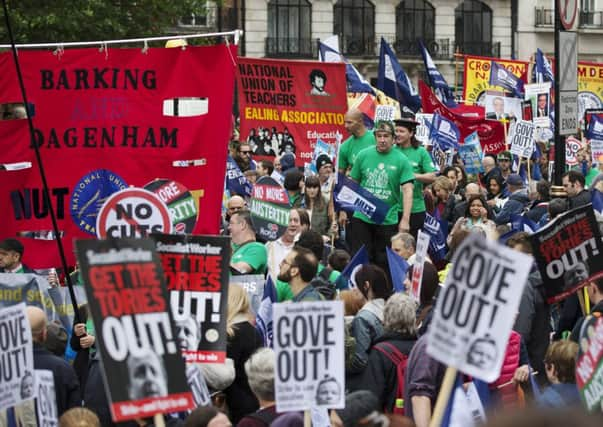Unions claim public sector ‘crippled’ after strike


Teachers, firefighters and council workers were among those involved in yesterday’s walk-out, which follows disputes with the government over pay, along with pensions and budget cuts.
The GMB and Unison unions said more than one million people had taken part, though Cabinet Office minister Francis Maude said fewer than 500,000 participated. In Scotland, job centres, courts and tax offices were hit by the stoppage.
Advertisement
Hide AdAdvertisement
Hide AdThe Public and Commercial Services union (PCS) said up to 28,000 public sector staff north of the Border had joined what was said to be the biggest strike over pay to hit the government since it came to power in 2010.
Many parts of the UK were affected by the fallout, with school closures in England and Wales and key services such as refuse collection and road safety on hold.
The biggest issue in the dispute is pay. In 2010, UK ministers froze public sector salaries and restricted pay rises to 1 per cent a year from 2012, which remains in place. Strikers say this is not enough to keep up with the rising cost of living. Annual inflation stands at 2.1 per cent.
The Prime Minister and other senior politicians criticised the industrial action, arguing that it was based on ballots conducted some years ago, which saw low turnout from union members.
Union officials claimed the one-day strike had caused “severe disruption” in Scotland, with court proceedings and the passport office affected.
The Scottish Court Service said an estimated 26 per cent of its staff had taken part, which led to a “reduced service” and the closure of two courts, at Portree and Ding-wall. The PCS claimed to have had a strike turnout of up to 97 per cent at job centres and tax offices. However, the UK government claimed all job centres remained open.
A spokeswoman for the Department for Work and Pensions (DWP) said: “All job centres are open today and we expect all claimants to receive their benefits as normal.”
Strike leaders said the dispute was aimed at the Scottish Government as well as Chancellor George Osborne, who has refused to remove the pay cap.
Advertisement
Hide AdAdvertisement
Hide AdJoy Dunn, PCS Scotland industrial officer, said SNP finance secretary John Swinney had the power to lift the pay cap for more than 7,000 workers who were employed by the Scottish Government.
She said: “People have voted with their feet and we’ve had severe disruption to services, with reports of 95 to 97 per cent support for the strike at DWP and HMRC [Revenue and Customs].
“Some courts have effectively been closed. The National Museum was closed and the Crown Office and employment tribunal service has also been affected.”
The PCS official warned that a wave of more strikes could take place, with an overtime ban at the passport office due to run throughout July as part of the action.
Labour MSP Neil Findlay, chair of the PCS parliamentary group, said workers were “being forced into action as they are desperate”, with the union saying some of its lowest-paid members were on salaries of between £12,000 and £14,000.
However, the strike was attacked as “irresponsible” by the Cabinet Office.
A Scottish Government spokesman blamed the dispute and public-sector pay freeze on austerity measures from Westminster.
He added: “This action has been planned since 30 May, 2014, and therefore is not connected to the outcome of pay negotiations within the Scottish Government.”